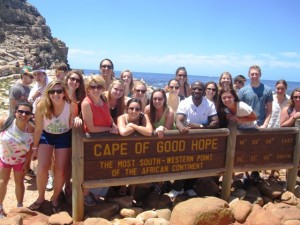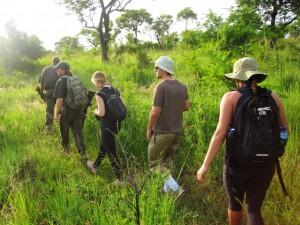“Nelson Mandela died on Dec. 5, 2013, less than a month before we arrived in South Africa,” says Kathy Delsener ’14, who was part of an interim-abroad course there early this year.
“I will never forget seeing all of the memorials in various cities decorated in flowers,” she says. “Many of them had inspirational words, but the one that I will never forget read, ‘Rest in the peace you gave us.’”
 Students in the course—Voices of South Africa: Cultural Diversity, Hegemony, and Agency—experienced a country still dealing with the aftermath of apartheid, a system of racial segregation which concluded with Mandela’s appointment as the country’s first democratically elected president in 1994.
Students in the course—Voices of South Africa: Cultural Diversity, Hegemony, and Agency—experienced a country still dealing with the aftermath of apartheid, a system of racial segregation which concluded with Mandela’s appointment as the country’s first democratically elected president in 1994.
Through travel, lecture, and discussion, the course immersed students in South Africa’s history of colonialism and apartheid, its structures of power and politics, and the ways it strives now to be a society founded on unity in difference.
“The issues in South Africa are much more complicated than I had realized prior to taking Voices of South Africa,” says Delsener, who graduated in May with a B.S. in civil engineering.
This year marked the fourth time the College has offered the course, which is taught by Margarete Lamb-Faffelberger, professor of German, and Rexford Ahene, professor of economics.
While Ahene focuses on teaching students about post-apartheid policy, Lamb-Faffelberger focuses on the strengths and challenges the country faces as a multiracial, multiethnic society. Often called the “Rainbow Nation,” South Africa nurtures a diversity of races and religions. Eighty percent of its population of 53 million are black, nine percent white, nine percent of mixed background, and two percent Indian or Asian. Citizens may practice Christianity, Islam, Hinduism, or Judaism.
 “We are trying to put these facts and figures into perspective,” says Lamb-Faffelberger, emphasizing that she teaches students to examine power in relation to race, religion, and economic status. “Who is in charge? Who is coming into their own right now? What is the situation for those who were in charge before?”
“We are trying to put these facts and figures into perspective,” says Lamb-Faffelberger, emphasizing that she teaches students to examine power in relation to race, religion, and economic status. “Who is in charge? Who is coming into their own right now? What is the situation for those who were in charge before?”
For the majority of the trip, students stayed at Stellenbosch University, living in dorms with South African students. Guest lecturers spoke on topics such as HIV and AIDS, Afrikaans culture, and the country’s colonial history. The class also visited numerous cultural sites, and their travels allowed the students to see the legacy of apartheid firsthand. For example, highways and train tracks frequently cut between communities of whites and blacks.
Abigail Williams ’15 (Sacramento, Calif.), who is dual majoring in neuroscience and policy studies, says the trip taught her about the importance of being a global citizen, aware of international happenings. It also inspired her senior thesis, which will explore public policy related to waste management in South Africa’s townships.
 Students in the course—Voices of South Africa: Cultural Diversity, Hegemony, and Agency—experienced a country still dealing with the aftermath of apartheid, a system of racial segregation which concluded with Mandela’s appointment as the country’s first democratically elected president in 1994.
Students in the course—Voices of South Africa: Cultural Diversity, Hegemony, and Agency—experienced a country still dealing with the aftermath of apartheid, a system of racial segregation which concluded with Mandela’s appointment as the country’s first democratically elected president in 1994. “We are trying to put these facts and figures into perspective,” says Lamb-Faffelberger, emphasizing that she teaches students to examine power in relation to race, religion, and economic status. “Who is in charge? Who is coming into their own right now? What is the situation for those who were in charge before?”
“We are trying to put these facts and figures into perspective,” says Lamb-Faffelberger, emphasizing that she teaches students to examine power in relation to race, religion, and economic status. “Who is in charge? Who is coming into their own right now? What is the situation for those who were in charge before?”